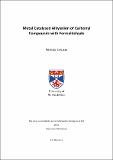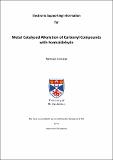Files in this item
Metal catalysed alkylation of carbonyl compounds with formaldehyde
Item metadata
| dc.contributor.advisor | Cole-Hamilton, D. J. (David John) | |
| dc.contributor.author | Lorusso, Patrizia | |
| dc.coverage.spatial | 192 | en_US |
| dc.date.accessioned | 2015-11-19T12:38:56Z | |
| dc.date.available | 2015-11-19T12:38:56Z | |
| dc.date.issued | 2015-11-30 | |
| dc.identifier.uri | https://hdl.handle.net/10023/7823 | |
| dc.description.abstract | Formaldehyde is a chemical used widely in the manufacture of building materials. A remarkable example is represented by the Lucite two-step Alpha technology for the large scale production of methyl methacrylate (MMA), the essential building block of all acrylic-based products. Esters and ketones are important intermediates in the manufacture of acrylate esters therefore α-hydroxymethylenation of carbonyl compounds using formaldehyde as a one carbon alkylating agent and subsequent dehydration to the corresponding methylenated derivatives has been explored in the current work. We report a novel catalytic approach for the synthesis of methyl methacrylate (MMA) via one-pot α-methylenation of methyl propanoate (a chemical intermediate of the ALPHA process) with formaldehyde, generated in situ by Ru-catalysed dehydrogenation of methanol. Elucidation of the mechanism involved in the catalytic dehydrogenation of methanol along with the collateral alcohol decarbonylation reaction was gained through a combined experimental and DFT study. The development of an alternative process where anhydrous formaldehyde is produced in situ would provide a simplification over the current second step of the ALPHA technology where the formaldehyde is initially produced as formalin, subsequently dehydrated to afford anhydrous formaldehyde in order to ensure high selectivity to MMA. As an alternative approach, ketones, in particular 3-pentanone and 2-butanone, were targeted as potential substrates in order to overcome some of the problems related to competing reactions that occur at the ester group. Hydroxymethylenation, followed by dehydration and Baeyer-Villager oxidation, possibly catalysed by enzymes to reverse the normal selectivity, leads to the formation of acrylate esters. The catalytic reaction is enabled by a gold carbene hydroxide complex in such a way that the substrate undergoes C-H activation and the nascent metal alkyl acts as a nucleophile towards the electrophilic formaldehyde, supplied in the form of alcoform* (solution of paraformaldehyde in methanol). | en_US |
| dc.language.iso | en | en_US |
| dc.publisher | University of St Andrews | |
| dc.relation | J. Coetzee, Ph.D Thesis "Towards new catalytic systems for the formation of methyl methacrylate from methyl propanoate", University of St Andrews (St Andrews, UK) 2011 | en_US |
| dc.subject | Methyl methacrylate (MMA) | en_US |
| dc.subject | Lucite ALPHA technology | en_US |
| dc.subject | Homogeneous catalysis | en_US |
| dc.subject | Ruthenium | en_US |
| dc.subject | Gold | en_US |
| dc.subject | Methyl propanoate (MeP) | en_US |
| dc.subject | Ketones | en_US |
| dc.subject | Alkylation | en_US |
| dc.subject | One-pot conversion | en_US |
| dc.subject | Methanol dehydrogenation | en_US |
| dc.subject | Methanol decarbonylation | en_US |
| dc.subject | Anhydrous formaldehyde | en_US |
| dc.subject | C-H activation | en_US |
| dc.subject | Mechanistic studies | en_US |
| dc.subject | Kinetic isotope effects (KIEs) | en_US |
| dc.subject | DFT | en_US |
| dc.subject | Reaction intermediates | en_US |
| dc.subject | Ortho-deuteration | en_US |
| dc.subject.lcc | QD305.A2L7 | |
| dc.subject.lcsh | Alkylation | en_US |
| dc.subject.lcsh | Carbonyl compounds | en_US |
| dc.subject.lcsh | Methyl methacrylate--Synthesis | en_US |
| dc.subject.lcsh | Formaldehyde | en_US |
| dc.subject.lcsh | Catalysis | en_US |
| dc.title | Metal catalysed alkylation of carbonyl compounds with formaldehyde | en_US |
| dc.type | Thesis | en_US |
| dc.contributor.sponsor | Lucite International | en_US |
| dc.type.qualificationlevel | Doctoral | en_US |
| dc.type.qualificationname | PhD Doctor of Philosophy | en_US |
| dc.publisher.institution | The University of St Andrews | en_US |
This item appears in the following Collection(s)
Items in the St Andrews Research Repository are protected by copyright, with all rights reserved, unless otherwise indicated.


